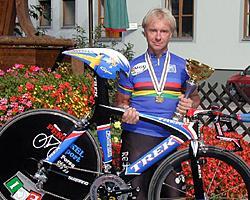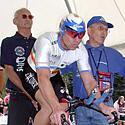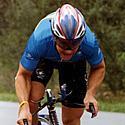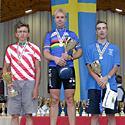
Recently on Cyclingnews.com |
An interview with Thomas Åberg, September 20, 2004
Bittersweet memory

|
On August 25 this year, Swede Thomas Åberg experienced a sweet but short joy. At the World Masters Road Championships in St. Johann, Austria, the 2001 and 2002 world time trial champion took his third world title, this time in Class 3 (for riders between 45 to 49 years old), and immediately went back to his apartment to celebrate with friends.
Unlike his two previous world titles though, Åberg was asked to participate in a UCI doping control, but his overzealous nature saw him disqualified from the race for a 'no-show'. After hearing his side of the story, Gabriella Ekström questions the harshness of the punishment in light of the non-routine nature of drug testing in masters' racing.
"I have done it again, I have won the World's for the third time. I can't believe the happiness I'm feeling."
This is how Thomas Åberg reacted after what he thought was his third masters' world title. However, only hours later, joy turned into disbelief and then frustration. He was a 'no show' at the doping control.
In bicycle racing, it is up to the rider to find out if he or she is wanted for a doping test, and it is their responsibility to get themselves there in time, no matter how tired they are or how tricky the location for the test is to find. At big races, like the Tour de France for example, this is perfectly clear, and is rarely a problem for experienced professional riders. However, veteran riders are not pros; they might not even be elite, and they lack the routine of some racing procedures that professional riders and their managers and directors have.
"I have eagerly awaited a doping test, so that I could get a chance to prove myself a clean rider."- Thomas Åberg claims he had no intention of avoiding the anti-doping control |
Despite an early start, Thomas knew immediately he'd done a great time, but was still surprised when he learned that reigning world champion Joerg Echtermann finished 12 seconds behind him. Overwhelmed with joy, Thomas then makes a fatal mistake, and doesn't return to the start/finish area after he knew he'd won.
"I was thrilled that I had done it again, and me and my friends went back to the apartment we had to celebrate," Thomas says. "The prize ceremony was held later in the afternoon, and we walked back in time for that. I heard someone calling something that remotely sounded like my name on the loudspeakers, so I walked up to him and presented myself. They told me I had to go with a controller. I was relieved, because I have eagerly awaited a doping test, so that I could get a chance to prove myself a clean rider. I had wished for a proof to show suspicious people who want to know what I'm having for breakfast. However, the people from UCI didn't look too happy when I met them, and they tried to explain that I had been disqualified. It took a while for that to sink in."

|
"They told me that they had been looking for me, and that I had failed to show up. At this point, my whole body started to shiver and I refused to believe that what I was hearing could be true. I told the gentlemen that they were more than welcome to take all the tests they wanted now, but it was too late. That meant they had done enough in order to find me, and that I myself was obliged to find out if I was wanted for a test or not. I had no choice but to walk away, empty inside. Their decision hit me as hard as if someone close to me had died, and I could only lay on my bed and stare up in the ceiling. It was truly a horrible experience."
Although Thomas didn't return to the finish straight after he had heard the news, he had still been around after his race, and he explains that several of his friends were still in the area after the winner had been announced.
"It was only the day after the race that my thoughts started to wander. I realised that no other Swede had heard anything about me being sought after, and since they all know me, that information would have got to me. A friend of mine whom I had asked to keep an eye open for any eventual tests was located in the start and finish area for several hours, but he didn't see or hear any signs of me being wanted for a doping test."
Adds Åberg, "Straight after the race, I did a one kilometre roll off before I returned to the finish area. I looked at the result board, where I was still at the top. This would have been a good place to present information about doping tests, since people naturally gathered there, but I saw none. The race was still going on when I was there, since I was the first starter in my group. It is possible that they waited until everyone had finished since they wanted to test the winner, but to add to my problem, there were masses or riders everywhere and a lousy loudspeaker system with rapid German Austrian that didn't help me either.
"Once I knew I had won, I was so happy that the thought of any tests vanished from my head, and I knew I hadn't been tested the two previous times that I won."
With the problem occurring because of inexperience from the riders' side, does Åberg find it frustrating that as a veteran rider, he is hardly ever tested, and is thus never accustomed to drug testing?
"Yeah, I think it would be good if there were frequent tests, because then the routines would be better. I realise that it is a matter of money, and that's why we aren't tested so often. I am convinced that there's no doping in veteran cycling, because at least in Sweden, there's no money to make in it. We are just happy, enthusiastic people who like to ride our bikes."

|
"The ironic thing though," Åberg continues, "is that the announcement of the tests worked out fine after the road race. At the natural stop after the finish, they had signs with the start numbers who were called, and a person announced via a functioning loudspeaker who were to be tested.
"The irony comes when my friend Hardy Blom was selected for a control; I followed him to the control, which we finally managed to find. When we got there, Harry was given a paper to sign and that was it. He was surprised to say the least and asked them if they intended to perform the test, but they said there was no need to. Hardy then demanded to be tested, but they told him that it would cost him a hundred Euros should they proceed with a test. We have since realised that most of the riders that had been 'tested' in our class, if not all, only received and signed a paper, confirming that they had showed up."
"As a veteran rider, I myself pay my way to the Worlds. I have no one from the Swedish Cycling Federation backing me up, and we have no coach who can help us keep track of the existing rules. My hope now is that the Swedish federation will help me get some justice in this case, since I believe I have been wrongly disqualified. If the UCI wants to run the veteran World's in a professional way, I think there have to be some changes.
Since he is racing in a Swedish national jersey, and has a permit from the Swedish Cycling Federation to race abroad, I asked him to specify the information he has been given, and the rules of conduct he is supposed to follow, but there appeared to be none.
"The bureaucracy surrounding the sport seems to be a hornets' nest of rules" |
"I'm afraid I haven't been given any information at all from the federation. The world championships is the most prestigious race you can win as a veteran, and I think we should be provided with a leader at the very least. Look at the Italians, who come here with a whole pack of people. From my point of view, since I'm now a victim of this, it feels crucial that we get a leader who can help us keeping track of rules and other things there are to know. This mistake has had great consequences for me already. I come from a little city in Sweden, and as a private person, I feel violated. For this reason, I think that the Swedish Cycling Federation must make an effort to help us veterans without elite background learn what is expected from us."

|
I like this sport a lot, both as exercise and for racing, but the bureaucracy surrounding the sport seems to be a hornets' nest of rules, and that has taken away some of the joy with a pure sporting event. I have no experience of being an elite or professional rider; I have never had an elite license, and I have no experience with doping controls from my previous world championships, of which I have won two.
Considering that, as I see it, a minor incident has occurred, a disqualification is a too harsh punishment! Despite experienced commissaries, there was obviously something that wasn't right in my starting group. Before us, I saw riders with forbidden helmets who were allowed to start, but as my group started, they changed their mind and told us that from now on, only approved helmets would be allowed. There was also an unidentified rider, number 464 in my group, who should really have been placed in another age group."
"After the race, I realised that the number on my 'no show report' from the anti-doping test, was not the same as the number I rode with on my back. Since I was called to the start one minute too early, according to my own calculations, there were starters every 30 seconds, it seems possible that I had number 465 in their lists, while I had pinned 463 to my back. If number 465 was sought after for the test, it's quite natural that neither myself nor anyone in my club reacted."
Still hoping that he will be cleared, Thomas insists that information is the key to avoid similar incidents in the future.
"I think there are things they could do to inform us in a better way. When you pick up your start number for example, you'll get a bag with sponsor items, there would be a perfect place to put an information sheet on several languages about doping controls. Personally, I know I'm totally clean, and I also know I was the fastest rider in my class. Morally, I feel like the true world champion, and no one can take that away from me, but of course I'm bitter that I couldn't bring the trophy with me home."
